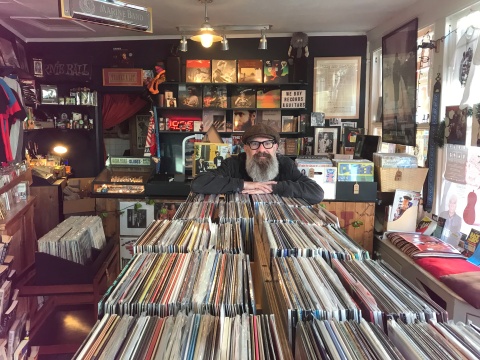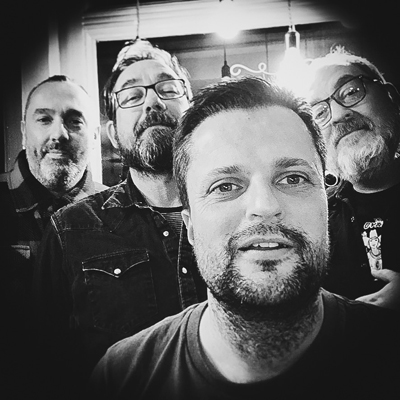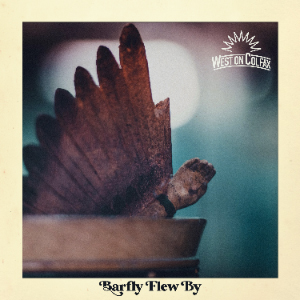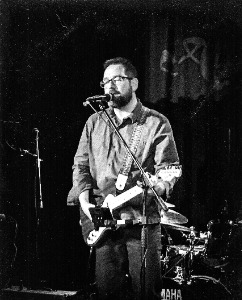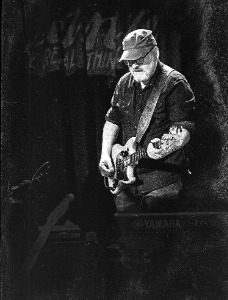
Matt Hill is the artist formerly known as Quiet Loner. For his new album, Savage Pilgrims – a collection of story / character songs told by different narrators – he’s decided to put it out under his own name, rather than the moniker which his previous four records have been credited to.
“In 2020 I turned 50 – it seemed the right time to ditch the Quiet Loner name and to release this album under my own name. Finally, I’m Matt Hill again,” he says.
Fittingly, it’s an album that sees him returning to his roots – some of the songs, like the folky Bendigo, which is the tale of a celebrated prizefighter, and the country-blues of Four Corners, are set in Nottinghamshire, which is where he grew up. Hill was born and raised in the mining town of Eastwood – the hometown of DH Lawrence. The novelist and poet actually features in one of the songs on the album, the haunting and moody, Spaghetti Western-flavoured The Exile of DH Lawrence, although it concerns itself with the last few years of the protagonist’s life, spent wandering the deserts of New Mexico, stricken with TB. The album’s title, Savage Pilgrims, comes from a phrase Lawrence used to describe his time in voluntary exile – he called it his “savage pilgrimage.”
Hill describes the album as “Americana rooted in British history and his own upbringing in a working class culture obsessed with America.” Savage Pilgrims is also a rootsy album musically – it’s influenced by country/Americana, folk, blues, spirituals and gospel.
It was recorded with producer/collaborator Sam Lench in an attic studio above a 19th century pub in Northern England, where George Orwell used to drink – The King’s Arm, in Salford. Hill and Lench wanted the listener to feel like they were in the room, sat next to the storyteller, with people playing instruments all around them, so the performances were recorded live to analogue tape, using vintage microphones and with minimal overdubs.
This makes for a great and interesting sounding record – intimate and immersive, but rhythmic, raw and rough around the edges. Hill’s vocals take centrestage – it’s like he’s singing in your ear – accompanied by traditional folk or Americana instruments, including acoustic and electric guitars, (James Youngjohns and Lench), double bass, banjo, mandolin and percussion.
Lench plays cello on Billy’s Prayer, which was written about a fairground boxer – Billy Marchant – who turned professional and became a sensation in America, while singer-songwriter Kirsty McGee provides backing vocals on several songs. For the bluesy and upbeat opener, Stone & Bone, in which the undead rise from their graves in an ancient cemetery to terrorise the Stock Exchange in the City of London, she plays a musical saw in a stairwell, which creates an eerie and ghostly effect. She also adds flute to the gorgeous, pastoral, folk ballad, If Love Should Rise, which was inspired by the stunning landscapes of the Peak District, which is where Hill now lives.
Diehard Quiet Loner fans will be glad to know that Hill has resurrected one of his old songs, Get Me Johnny Cash On The Phone, for the new record, although it’s now called Gary Gilmore’s Last Request – a country song about a convicted murderer on death row getting a phone call from his hero, the Man In Black.
Here at Say It With Garage Flowers, sadly, we couldn’t get Johnny Cash on the phone, but we did manage to have a chat with Hill about his new album, which we think is his best yet, his musical influences, his love of Elvis Presley, his upbringing and, er, his appearances on daytime TV…
Q&A
You have described Savage Pilgrims as “Americana rooted in British history, based on your own upbringing in a working class culture obsessed with America.” Why do you think US culture played such an important role in your younger years and in the lives of some of the people in the area where you grew up?
Matt Hill: It’s undoubtedly true that American culture dominated working class culture – it still does, except now it’s hip-hop and gaming. Growing up in the ‘70s and ‘80s, country music was still a strong influence. I think Western movies played a big part in that too. It wasn’t unusual to see blokes dressed up as cowboys. I don’t think it was just in the coal mining areas – it was right across the UK. But it seemed particularly strong in Nottinghamshire – we even had nodding donkeys, like on Dallas. People probably don’t know, but Nottinghamshire actually had its own oilfield. We had a long-running Americana festival in Newark and there was even a theme park just up the road from me, called the American Adventure. Notts is the Texas of the UK.
While we’re on the subject of classic US culture, you’re an Elvis fanatic, aren’t you? How and why did your obsession with the King come about?
MH: I became obsessed with him when I was about eight years old. It was just after he died and his films were on TV a lot. All I wanted to do was listen to him and read about him. It sounds crazy, but there was actually an Elvis shop about three miles from my house. It turned out it was the only one in the UK and it was in a Derbyshire mining town! The guy who set it up ran the British Elvis fan club too and had a direct line to Elvis and The Colonel [Tom Parker – Elvis’s manager] from his Derbyshire home!
At the very end of your song Gary Gilmore’s Last Request, it sounds like you’re doing a slight Elvis croon. Was that intentional?
MH: As for the Elvis inflection in my voice, people usually spot Costello, but, yeah, Presley is in there too.
Gary Gilmore’s Last Request is one of the more Americana / country tracks on the new record. It’s a very old song – it used to be called Get Me Johnny Cash On The Phone – and is a Quiet Loner cult classic and live favourite. Why did you resurrect it for the new album?
MH: I wrote that song in the late ‘90s, after reading Norman Mailer’s book The Executioner’s Song. Here was a guy on death row and the one thing he asked for was to speak to Johnny Cash. That one detail blew me away. I did record it around 2001 – for one of those very early Matt Hill EPs. I recorded it again for my aborted second album in 2004, and it was on the shortlist for my Spectrology album in 2010, but it just never seemed to fit on anything. Once the songs for this new record started to come together, as being more narrative and story-based, then it was really clear that Gary Gilmore belonged on this record.
If you were on death row, what would be your last request?
MH: A phone call from Johnny Cash would be right up there on my list too. But he’s not with us, so I’d probably ask for a phone call from Kris Kristofferson or Willie Nelson. They’re probably the closest we’ve got to Johnny.
‘The songs that most appealed to me as a kid were all about middle-aged people getting divorced. I was clearly a strange child’
Did you get into country music and then Americana from Elvis? Was it a natural step?
MH: Elvis is such a good person to listen to for a musician because he has so many different elements in his music. You will find country, bluegrass, blues, gospel, folk and soul. He really did create a kind of “cosmic American music” of his own in the late ’60s and early ‘70s. I think country music came to me around the same time I start listening to Elvis.
Once I knew about Sun Records, that introduced me to Johnny Cash. I also watched The Dukes of Hazzard and loved the theme song. And then Dr. Hook and Don Williams were two formative influences because that’s what my dad was listening to. I loved the stories in the songs – I hear things very visually, so those songs painted pictures in my head. It’s fascinating to me how the songs that most appealed to me as a 10 or 11 year-old-kid were all about middle-aged people getting divorced. I was clearly a strange child.
You’ve published a zine to accompany the launch of your new album. In one of the articles in it, you say that an English folk singer once said he couldn’t understand why you sang in an American accent and played country. Ironically, you were being authentic to your English roots by playing music that’s come from the US – the stuff you grew up with.
You also say that English folk music wasn’t on your radar until you were in your 20s. Over the past few years, you’ve embraced more folk music though, haven’t you? Songs like If Love Should Rise, Bendigo and Billy’s Prayer feel like they come more from the English folk tradition than US roots music…
MH: I feel like I’ve embraced a lot of different influences on this album and, yes, some of it is more rooted in English folk, but very loosely, because I don’t have much grounding in it. Other than Nick Drake I’ve not listened to a lot. In the early ‘90s I was briefly in a band called Seven Little Sisters that did a lot of Irish folk, as well as bluegrass, so I learned a lot from that.
‘American culture is authentic to where I’m from. No one sang traditional English folk songs in my upbringing’
You mentioned that folk person who said I wasn’t being authentic. That really troubled me for a long time, because it’s true that I don’t sing in a Nottingham accent. In fact I’ve moved around so much in my life I don’t even speak with a Nottingham accent anymore. But I have always wanted my music to be authentic and true to my own experiences, so that comment really did bother me at first. But that person was wrong – American culture is authentic to where I’m from. No one sang traditional English folk songs in my upbringing.
I’ve worked in prisons – all the lads there rap in American accents but it’s real to their lives. They can identify with the whole ‘gangsta’ thing because it’s about crime, money, family and tough working class upbringings. Just like country music was for a previous generation. To me, authenticity comes from the purity of your intention. The sound of a voice, like the sound of a guitar, or the way you rap, are all just stylistic. The substance of music comes from purity of intention and opening up a channel to the heart.

There are two songs about boxers /fighters on the new album: Bendigo and Billy’s Prayer. Are you trying to tell us something? Morrissey went through a phase where he was obsessed with boxers. Is it a melancholy, Northern singer-songwriter thing? Are you handy in the ring?
MH: To be honest, I’m not a fan of boxing. I find it brutal and I see a class aspect to it that I really don’t like. It’s controlled by very rich people, paying ridiculous amounts of money to watch working class men and women beat each other up. But, on the other hand, boxing gyms play an important role in working class communities. A gym can give kids hope and discipline and self-belief in environments where that stuff is in short supply. So I have mixed feelings about it. But I’m always in search of a good story and Bendigo is a great story and connects to my family and roots. The story of Billy Marchant is fascinating, so I had to put that song on the album too.
Did you have a long list of songs for the new album?
MH: I started with about 25 songs. I worked with Kirsty McGee on the pre-production. She has such a good grasp of songwriting and I really value her opinion. We’d also done a fair bit of touring together, I’d been to Holland and Germany with her and so she knew my live set pretty well, so she helped me whittle down 25 songs into an album. For me, when I’m making an album I always have so many songs – it’s not a case of picking the best 11, but of finding the songs that belong together. I’m passionate about albums for that reason and I get sad that technology formats are rendering them obsolete.
Savage Pilgrims is a musically diverse record: folk, blues, country/ Americana, gospel and spirituals. What kind of inspirations and influences were you drawing on?
MH: This comes back to what I was saying about Elvis – all those American music forms you mention. I’ve spent my life listening to those, so they come out in the way I perform. Some of that comes from the choices we made when recording too. Sam Lench is really knowledgeable about folk music, so when he added a guitar part on If Love Should Rise he chose a weird guitar tuning, so it sounds proper folky. Four Corners is about a crossroads, so I wrote blues influences into that from the very start. Those sort of musical choices really colour the music.

What inspired the striking album art? I really like the moody, black and white look you’ve gone for – the photos of you are great…
MH: I put out four albums as Quiet Loner and nowhere on any of those albums will you find a photograph of me – not even on the inside. That was a choice. So because this was a fresh start, I decided I would go in the opposite direction and stick a photo of myself on the cover. So then I had to find the right person to work with. I was really drawn to working with Nicola Davison-Reed, after seeing her portrait work online. I talked to her about the sound of the record and the vintage sounds we used – she did the rest. She’s an incredible artist and I’m delighted with the results that she got.
As well as Savage Pilgrims, you’ve also put out a ‘Greatest Hits’ collection. It’s called Twenty/Twenty – An Introduction To Matt Hill and is available as a free 20-track download from your website. How was it going through your back catalogue to put that together?
MH: Prior to lockdown I’d been rehearsing regularly with James Youngjohns, who I’ve been making music with for 20 odd years. James encouraged me to delve into the back catalogue and we were playing songs from that first album. So when it came to putting 20 tracks together, I’d already been looking back and deciding what I liked and what I didn’t.
There are some rarities on it, like She Means Everything, which is Matt Hill does pop-soul! Do you have a lot of unreleased stuff in the vaults? Isn’t there a ‘lost’ album? Will it ever see the light of day?
MH: There is indeed a lost album and that song, She Means Everything, is from it. I recorded it in 2004 – the year Secret Ruler of the World [debut album] came out. I wasn’t a happy person at the time and my anxieties and insecurities got the better of me and I ended up shelving it. It’s something I now regret. That album means a lot to me because it features my friend Chris Evans. He and Mike Harries put a tremendous amount of work into that album and it would be nice to get it released at some point. Chris took his own life in 2013. A few days before he died we had met up and were reminiscing about that lost album and making plans to work together on a new one. It was not to be.
Have you written any new songs recently? Has lockdown inspired you?
MH: I have written some new songs but I’m definitely not getting any inspiration from lockdown. I’ve got a few political songs and there are a couple that I think are decent – one about a soldier coming back from World War II and another about living with chronic illness. I probably only release about a third of all the songs I write.
‘I can’t see music venues reopening until next year. I’m trying to adapt and stay positive, but there is a very real chance I may not be able to make a living’
What are your plans for the rest of 2020?
MH: I’m hopefully releasing a new album with a band project called The Low Drift, but, aside from, that I really don’t know. So much of how I make my living is tied up in delivering songwriting workshops. These are usually delivered in community settings, like at a homeless centre, in a prison, or at a dementia care home. None of those sessions have been able to continue, but I’m hoping to begin work on a songwriting project that’s being done over the phone.
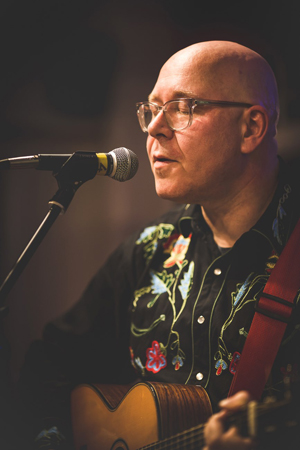
Longer term, I think we will see a massive crash in the economy and that always hurts funding for the arts and charities. I can’t see music venues reopening until next year. I’m trying to adapt and stay positive, but there is a very real chance I may not be able to make a living this time next year. Sadly there will be many people in that position – not just musicians and artists.
Finally, you’ve had several brushes with fame – and infamy. You’ve appeared on daytime TV – Flog It! and The Jeremy Kyle Show – played at Glastonbury, thanks to Billy Bragg; you once had to shake Jacob Rees-Mogg’s hand, and you spoke with Jimmy Savile about Elvis! How would you like to be remembered?
MH: Thanks for reminding me of some of my darkest days! Yes, it’s true – I have met more than my fair share of villains! For many years I had to go to all the Party Conferences for my job, so I have met so many politicians and journalists, but I certainly wouldn’t want to be remembered for meeting Jeremy Kyle, Jacob Rees-Mogg or Jimmy Savile! I would be happy to settle for simply being remembered fondly by my surviving friends and family.
Savage Pilgrims by Matt Hill is released on July 6 (Quiet Loner Records).
There will be an online album launch event on Sunday June 28, at 8pm: details on Matt Hill’s Facebook page: https://m.facebook.com/matthillsongwriter/
https://matthillsongwriter.com/
https://quietloner.bandcamp.com/
